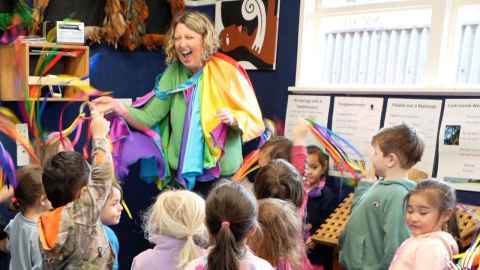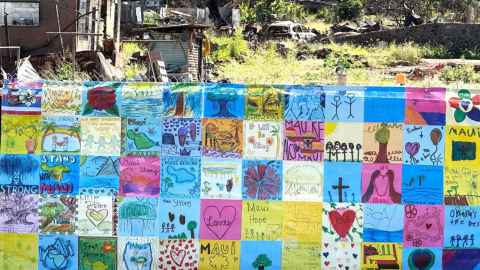Creative resources to help young children after trauma
19 May 2025
Designed to be used after distressing experiences and to support young children's well-being generally, a new set of arts-based teaching resources aimed at early childhood is now available.

Young children love playing and having fun, but their lives are not always rosy.
With around 87 percent of children in Aotearoa New Zealand experiencing at least one trauma before the age of eight,* there was a gap in educational resources that support them after trauma, researchers at the University of Auckland discovered.
A new set of arts-based activities designed to deal creatively with post-trauma situations is now available at the Te Rito Toi website, created by the University’s Centre for Arts and Social Transformation (CAST).
Devised by a team led by centre research assistant Emily Gibson, the resources are aimed at early childhood educators, teachers of primary-aged children, parents and community workers.
“We realised we were uniquely positioned to expand Te Rito Toi [a free resource hub for educators] to support children aged three to five, who are particularly vulnerable to developmental impacts from early adverse experiences,” says Gibson.
“So the centre responded to a global lack of free arts-based resources for early childhood educators and many requests internationally to expand Te Rito Toi.”
The new resources focus on how educators can support children to process their experiences, learn about themselves and connect with their peers and community, she says.
They include a range of arts-based learning experiences; instructional videos; nervous system regulation activities; picture book recommendations for young children and expert guidance on grief and trauma-informed approaches; in other words, approaches that recognise the impact of trauma on individuals.
Gibson says the team initially set out to create a handful of arts-based lessons early childhood educators could use when children returned to early learning centres after trauma, caused by anything from floods, fires and earthquakes to pandemics and terrorist attacks.
“However, after talking with educators across the country and the Pacific, the expansion quickly ballooned into a significant focus on more professional development for teachers, particularly relating to trauma and grief,” she says.

Research assistant Katy Perez, who also worked on the redevelopment project, says they knew it was critical this resource be trauma-informed to ensure they were offering children transformative experiences that help them feel supported by their community, able to explore their experiences, and that re-ignite their hope for the future”.
“We were fortunate to have an incredible group of contributors who are early childhood educators, art educators, teachers, librarians and trauma-informed practitioners from across Aotearoa, Australia and Hawaii,” she says.
One activity uses yoga to help children build trust in themselves and their peers, another explores grief and loss through the lens of a tree that loses its branches.
And yet another, called ‘Ka ora te whenua, ka ora te tāngata ‘(When the land is well, the people will be well), helps children understand the connection between well-being and te taiao (the natural world).
A further activity, which focuses on adults, came from partnering with the current Te Awhi Rito New Zealand Reading Ambassador Alan Dingley. It’s designed to build peer support among adults while discussing how mental health might impact family members, and how they can best support themselves and their families.
Gibson and the wider CAST team, including co-directors Professor Peter O’Connor and Professor Selina Tusitala Marsh, also collaborated with arts educators at the Maui Arts and Cultural Centre on a set of resources and videos developed with the community following the devastating fires in Lahaina in 2023.
O'Connor says the centre is very grateful for the support of the Chartwell Trust as its core funder, and to The French Café, which hosted a fundraising event to support the rejuvenated Te Rito Toi site.
“Their generosity will help thousands of children return more easily to learning after traumatic events," he says.
CAST is now looking forward to rolling out the expanded resources and offering professional development for educators and teachers across Aotearoa.
* (Ministry of Social Development, New Zealand, 2025)
Media contact
Julianne Evans | Media adviser
M: 027 562 5868
E: julianne.evans@auckland.ac.nz